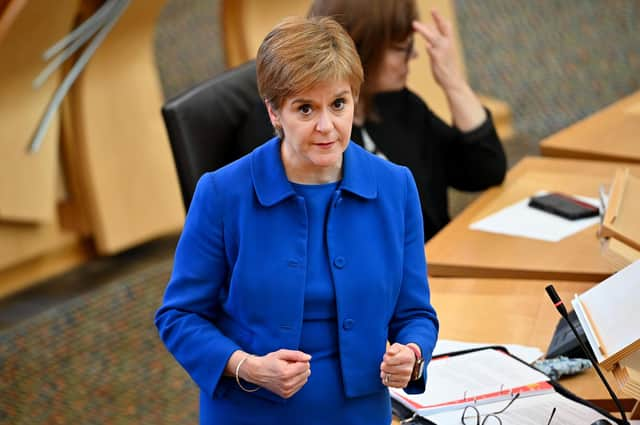Nicola Sturgeon should stop moaning and start explaining why so much money from Westminster makes so little difference to Scotland – Brian Wilson


The reasons go back to the origins of devolution and the status of its founding father, Donald Dewar.
Donald carried huge influence and was certainly not going to allow a financial settlement which left the new set-up cash-strapped. Why would he? So a very high baseline was established and has been built on, via the Barnett Formula, ever since.
Advertisement
Hide AdAdvertisement
Hide AdThere has been a global financial crash and transition from Labour to Tory governments along the way but Scotland’s block grant has survived pretty much unscathed. The range of powers has increased and fiscal devolution widened the base but the fundamental truth remains.
This week, the Chancellor announced an increase in next year’s block grant to £41 billion which will be £3.9 billion more than in 2019-20. That, for any reasonable person, is the appropriate line of comparison which took us up to the start of the pandemic.
Regardless of the Budget’s merits as a whole, it offers the Scottish government a huge increase in funds available for front-line services. Every respectable economist has recognised this, yet for our devolved rulers it has merely been another cue for grievance.
Their complaint is that it means less money than during the pandemic at its height when extra funds were poured into Scotland, the UK and the world. Are there politicians, I wonder, anywhere else in the universe, who pretend that the extreme circumstances of the pandemic years should provide the relevant future baseline?
Until Scotland transitions from moaning about not getting enough to asking hard questions about how money is spent and why it is to so little obvious effect, we will remain stuck in the same place. If the effrontery of the Sturgeon-Forbes response hastens that day, it will serve a purpose.
One glaring deficiency lies in the fact that since devolution there has never been a comprehensive review of spending priorities. As long as the presiding mentality is simply to demand more, the need for hard choices never arises while soft ones – like the brutal treatment of local government – slip through.
When Labour came to office in 1997, Gordon Brown’s best decision as Chancellor was to freeze overall spending at the inherited level pending a Comprehensive Spending Review so that tough choices had to be made. This imposed a discipline, both fiscal and intellectual, which I have never forgotten. No matter the sums involved, spending must be defined by priorities.
A populist government will always shirk that fundamental review because, inevitably, it will result in losers as well as winners and the rhetoric of progressive politics will be exposed as a sham. Next to nothing is happening in Scotland to attack the vast disparities of advantage and disadvantage that persist and there is no political appetite for facing up to that.
Advertisement
Hide AdAdvertisement
Hide AdI heard on radio yesterday a discussion about Glasgow’s filthy condition between a Labour MSP for the city, Paul Sweeney, and the SNP MP for leafy East Renfrewshire, Kirsten Oswald. There are nine SNP MSPs in Glasgow, including Ms Sturgeon. Was none of them available to defend her treatment of local government in general and Glasgow in particular?
However, Ms Oswald’s curious presence served as an inadvertent reminder of another fundamental review that has never happened. Back in 1995, the Tories reformed local government and Glasgow’s boundaries were shamelessly gerrymandered to exclude the most prosperous suburbs. There were similar manoeuvres elsewhere.
Why, after 14 years of SNP rule, have these boundaries – and indeed the structure of local government – never been looked at again? The answer is the same – that there would be losers (the better off) as well as winners (the poor and the marginalised). That would involve political risk so don’t touch it with a barge-pole.
Until Scotland sees through the politics of populism, in which someone else is always to blame, the extra billions will continue to disappear into a bottomless pit with little to show for them apart from a demand for more, while “fundamental reviews” of anything will be unscrupulously avoided.
A message from the Editor:
Thank you for reading this article. We're more reliant on your support than ever as the shift in consumer habits brought about by coronavirus impacts our advertisers.
If you haven't already, please consider supporting our trusted, fact-checked journalism by taking out a digital subscription.
Comments
Want to join the conversation? Please or to comment on this article.